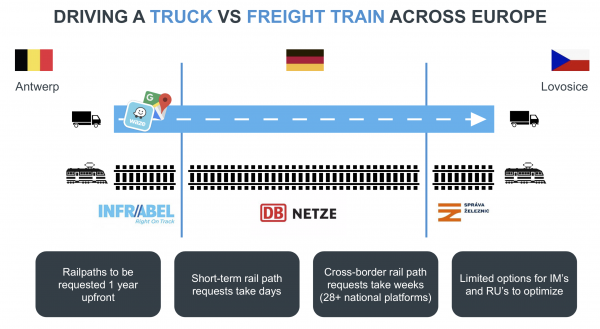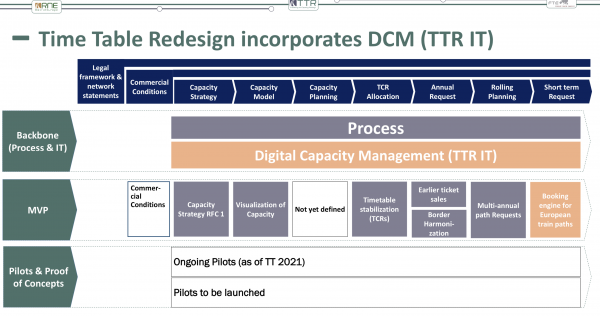Difference between revisions of "End-To-End Path Planning/Ordering"
From RFF Wiki
(Created page with " == Description == Standardized hand-over information, path order information, negotiation work-flow == Use Case == == Preconditions == === Basic Services === == Depen...") |
|||
| (6 intermediate revisions by the same user not shown) | |||
| Line 2: | Line 2: | ||
== Description == | == Description == | ||
| − | + | * High quality rail path booking to support modal shift | |
| + | * Avoid conflicts between passenger & freight | ||
| + | * Better alignment of rail paths with infrastructure works | ||
| + | * Optimizes RU / IM resources and way of working | ||
| + | * Enabler of Long Term Timetables & Time Table Redesign (TTR) | ||
| + | * More capacity with same infrastructure | ||
| + | |||
| + | [[File:RFF_DCM_railways.png|border|600px]]] | ||
== Use Case == | == Use Case == | ||
| + | DCM is the capability of IMs to meet customer demands on ... | ||
| + | * easy access | ||
| + | * to good quality capacity on rail infrastuture | ||
| + | * in all parts of the planning process | ||
| + | * for domestic and international transport across Europe | ||
| + | * allowing RUs and IMs for optimisation of ressources | ||
| + | ... by means of... | ||
| + | * Digitalisation | ||
| + | * Automatisation • Optimisation | ||
| + | ...for the full capacity managagement planning process | ||
== Preconditions == | == Preconditions == | ||
| − | + | [[Train Harmonization Service]] | |
| − | + | == Basic Services == | |
| + | * Digitalize the representation of infrastructure | ||
| + | * create automated construction | ||
| + | * create optimization with algorithms for single day and longer periods, | ||
| + | * create automated allocation, | ||
| + | * create interface with booking frontends to have one access for all | ||
| + | * create international harmonization/international optimization | ||
== Dependencies == | == Dependencies == | ||
== Planned Steps == | == Planned Steps == | ||
| + | * Core group of IM’s to take the lead (DB Netz, Infrabel, Prorail, SNCF Réseau, SBB Infra and ÖBB Infra) | ||
| + | * Coordination by RNE incl. a dedicated working group and RU’s for ‘customer view’ | ||
| + | * Funding by Green Deal and on national level | ||
| + | * Phased build-up to full European Digitally Connected Rail System | ||
| + | [[File:RFF_DCM_planning.png|border|600px]]] | ||
== Evaluation == | == Evaluation == | ||
Latest revision as of 14:21, 26 August 2021
Contents
Description
- High quality rail path booking to support modal shift
- Avoid conflicts between passenger & freight
- Better alignment of rail paths with infrastructure works
- Optimizes RU / IM resources and way of working
- Enabler of Long Term Timetables & Time Table Redesign (TTR)
- More capacity with same infrastructure
Use Case
DCM is the capability of IMs to meet customer demands on ...
- easy access
- to good quality capacity on rail infrastuture
- in all parts of the planning process
- for domestic and international transport across Europe
- allowing RUs and IMs for optimisation of ressources
... by means of...
- Digitalisation
- Automatisation • Optimisation
...for the full capacity managagement planning process
Preconditions
Basic Services
- Digitalize the representation of infrastructure
- create automated construction
- create optimization with algorithms for single day and longer periods,
- create automated allocation,
- create interface with booking frontends to have one access for all
- create international harmonization/international optimization
Dependencies
Planned Steps
- Core group of IM’s to take the lead (DB Netz, Infrabel, Prorail, SNCF Réseau, SBB Infra and ÖBB Infra)
- Coordination by RNE incl. a dedicated working group and RU’s for ‘customer view’
- Funding by Green Deal and on national level
- Phased build-up to full European Digitally Connected Rail System

